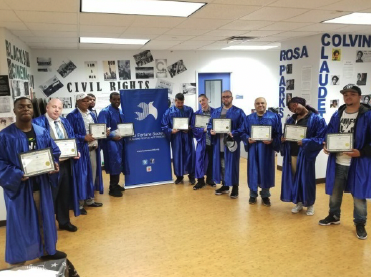There is wide range of challenges individuals face when re-entering the community from incarceration. Some of the biggest challenges include finding housing, finding and retaining employment, and handling issues with substance-use disorder.1 Over the past two decades, jurisdictions throughout the country have implemented new models to help address the multifaceted and complex issues individuals encounter after release and, in doing so, reduce the chances that those individuals end up back behind bars.
Programming and case management support, combined with connections to community resources, have been the underpinning of most reentry improvement efforts. A prime example of this approach is the Individualized Correction Achievement Network (I-CAN), operated by the Fortune Society in partnership with the New York City Department of Corrections. I-CAN is the largest discharge planning program for incarcerated and formerly incarcerated men and woman in New York City. Launched in 2013 and funded through the federal Second Chance Act, I-CAN serves about 6,400 people per year with programming for individuals who are at moderate to high risk of reoffending.
Often, however, individuals returning to the community confront obstacles that are beyond the scope of a case manager’s referral. Recognizing these needs, in 2016, the Fortune Society launched a mentorship program to provide additional, personalized support for a group of I-CAN participants.
The Mentoring Program was built into the framework of the I-CAN program. Prior to release, program participants were paired with a mentor, who provided one-on-one coaching and support, starting in the jail and continuing during the first crucial months following the individual’s return to the community. Throughout the transition process, mentors provided personalized guidance and assistance with navigating available services, modeling pro-social communication and relationship-building skills, and acting as an advocate for the individual’s success with the courts, service providers, and others in the community.
To assess the impact of this added layer of reentry support, the Fortune Society partnered with Public Policy Associates, Inc. (PPA). The evaluation included an implementation study, as well as a randomized controlled trial (RCT) to assess the impact of the program on participant outcomes relative to a control group.





